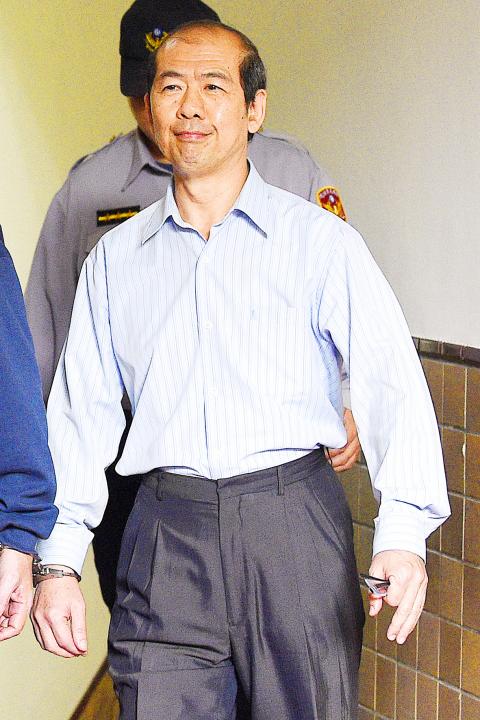The Legislative Yuan’s Internal Administration Committee on Monday is to review a proposed amendment to the National Security Act (國家安全法) that would cancel and confiscate pensions for military retirees convicted of leaking state secrets.
The amendment was proposed by Democratic Progressive Party (DPP) Legislator Chen Chi-mai (陳其邁) to close a loophole in regulations stipulating that the leaking of state secrets by military personnel after retirement does not result in their pension being canceled, as the case of retired major general Hsu Nai-chuan (許乃權), who was involved in the largest espionage case in the nation’s history.
Hsu was found guilty of leaking secrets to the Chinese Communist Party, but is still eligible to receive 70 percent of his original pension after serving his 34-month prison term, which ended in September last year.

Photo: Chen Chih-chu, Taipei Times
Under the Act of Military Service for Officers and Noncommissioned Officers of the Armed Forces (陸海空軍軍官士官服役條例), military retirees are only stripped of their pensions when they are found guilty of treason, are sentenced to life in prison or to death during their service, or are discharged for breaching the Punishment Act of the Armed Forces (陸海空軍懲罰法).
Despite amendments made in 2016, the National Security Act does not cover former military personnel who leak state secrets during their service, but who are convicted after retirement.
At present, military personnel’s pension would be canceled if they are sentenced to a prison term of seven years or longer; halved if the prison term is between three to seven years; reduced by 30 percent if the prison term is between two and three years; or reduced by 2 percent if they are handed a prison term of between one and two years.
Therefore, Hsu is still entitled to 70 percent of his original pension, or about NT$70,000 per month.
The draft amendment is an addendum proposing to cancel pensions to former military personnel if they breach the National Security Act, the National Security Information Protection Act (國家機密保護法) or the National Intelligence Services Act (國家情報工作法), and confiscate pensions already paid.
Meanwhile, a draft amendment to the Act of Military Service for Officers and Noncommissioned Officers of the Armed Forces, initiated by DPP Legislator Liu Shih-fang (劉世芳), seeks to cancel pension payments to active or retired military personnel and confiscate the sum they have already received if they are convicted of leaking intelligence.

CHAOS: Iranians took to the streets playing celebratory music after reports of Khamenei’s death on Saturday, while mourners also gathered in Tehran yesterday Iranian Supreme Leader Ayatollah Ali Khamenei was killed in a major attack on Iran launched by Israel and the US, throwing the future of the Islamic republic into doubt and raising the risk of regional instability. Iranian state television and the state-run IRNA news agency announced the 86-year-old’s death early yesterday. US President Donald Trump said it gave Iranians their “greatest chance” to “take back” their country. The announcements came after a joint US and Israeli aerial bombardment that targeted Iranian military and governmental sites. Trump said the “heavy and pinpoint bombing” would continue through the week or as long

TRUST: The KMT said it respected the US’ timing and considerations, and hoped it would continue to honor its commitments to helping Taiwan bolster its defenses and deterrence US President Donald Trump is delaying a multibillion-dollar arms sale to Taiwan to ensure his visit to Beijing is successful, a New York Times report said. The weapons sales package has stalled in the US Department of State, the report said, citing US officials it did not identify. The White House has told agencies not to push forward ahead of Trump’s meeting with Chinese President Xi Jinping (習近平), it said. The two last month held a phone call to discuss trade and geopolitical flashpoints ahead of the summit. Xi raised the Taiwan issue and urged the US to handle arms sales to

State-run CPC Corp, Taiwan (CPC, 台灣中油) yesterday said that it had confirmed on Saturday night with its liquefied natural gas (LNG) and crude oil suppliers that shipments are proceeding as scheduled and that domestic supplies remain unaffected. The CPC yesterday announced the gasoline and diesel prices will rise by NT$0.2 and NT$0.4 per liter, respectively, starting Monday, citing Middle East tensions and blizzards in the eastern United States. CPC also iterated it has been reducing the proportion of crude oil imports from the Middle East and diversifying its supply sources in the past few years in response to geopolitical risks, expanding

Pro-democracy media tycoon Jimmy Lai’s (黎智英) fraud conviction and prison sentence were yesterday overturned by a Hong Kong court, in a surprise legal decision that comes soon after Lai was jailed for 20 years on a separate national security charge. Judges Jeremy Poon (潘兆初), Anthea Pang (彭寶琴) and Derek Pang (彭偉昌) said in the judgement that they allowed the appeal from Lai, and another defendant in the case, to proceed, as a lower court judge had “erred.” “The Court of Appeal gave them leave to appeal against their conviction, allowed their appeals, quashed the convictions and set aside the sentences,” the judges